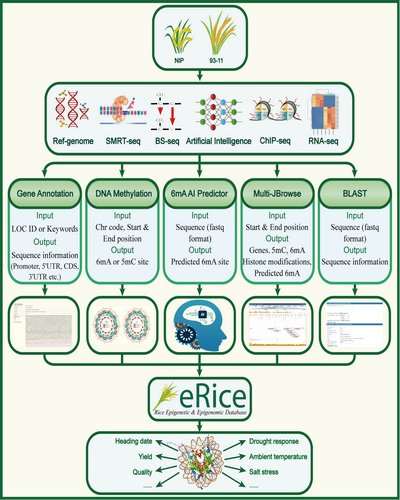Recently, professor Gu Xiaofeng and professor Tian Jian from the Biotechnology Research Institute, Chinese Academy of Agricultural Sciences co-founded the rice epigenetic intelligence database eRice (http://www.elabcaas.cn/rice/index.html), which innovatively displayed new DNA nucleic acids methylation maps and Artificial Intelligence (AI) predicted modification sites, as well as other types of apparent modifications. It can provide support for rice functional genome research and intelligent design breeding. The results were published in the Plant Biotechnology Journal.
Epigenetics refers to heritable changes in gene expression without changing the DNA, RNA, or protein sequence and participates in growth and development, gene expression regulation, and response to environmental signals. It is the basis of biological trait diversity. In recent years, the development of detection technology and high-throughput sequencing has promoted the research boom of epigenomics such as rice DNA methylation and histone modification, providing a basis for theoretical research and breeding applications. However, how to integrate multiple epigenomic data of rice and construct a data platform are the key issues currently. The epigenomic information about the distributions of epigenetic markers, especially 6mA, across rice genomes will enhance our understanding of the epigenetic regulation of complex biological processes in plant development for future breeding by molecular design. In addition, artificial intelligence technology shows broad application potential in epigenomics big data analysis and prediction.
The eRice database integrates the DNA adenine methylation and cytosine methylation genome maps, artificial intelligence prediction data of adenine methylation, and histone modification. Omics for the japonica rice variety "Nipponbare" and the indica rice variety "93-11" Data, and improved genomic information. The integration of epigenomic and genomic data has improved data utilization and deep mining capabilities, and realized systematic query and integrated display of gene sequence and annotation information, DNA methylation, histone modification, and intelligent prediction data of DNA methylation. The database will continuously update the epigenomics data, including RNA methylation, non-coding RNA and various histone modifications, as well as other ‘omics-based data, to extend the functionality of the eRice database and make it a convenient electronic platform for the community of rice researchers providing an information platform and data support for the intelligent design and improvement of important agronomic traits in rice.
The research was funded by the National Transgenic Major Program of China, the National Natural Science Foundation of China, and the Fundamental Research funds for Central non-profit Scientific Institution.
link page: https://onlinelibrary.wiley.com/doi/abs/10.1111/pbi.13329

|